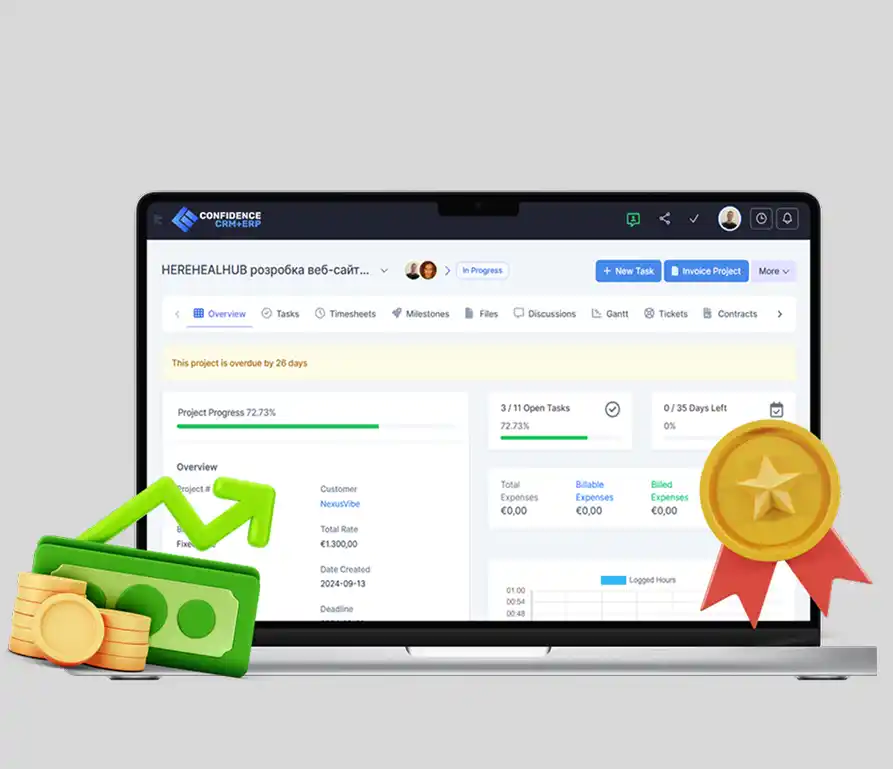

2025-07-12
CRM System for a Marketplace: The Key to Platform Owners' Success
CRM for Marketplace: Boost Growth & Manage Sellers
Tags:
A successful marketplace is not just about thousands of sellers and millions of buyers. It's also about efficiently managing every interaction, optimizing processes, and deeply understanding the needs of platform participants. This is where a CRM (Customer Relationship Management) system comes to the aid of marketplace owners.
CRM integration is not merely desirable but a necessary condition for the scaling and stable development of any business platform. Let's break down exactly how a CRM system can be beneficial for marketplace owners.
1. Centralized Management of Customer Data (Buyers and Sellers)
One of CRM's biggest advantages is consolidating all user information into a single database. For a marketplace, this means:
- User Profiles: Detailed information about buyers (purchase history, product views, preferences) and sellers (sales statistics, listings, communication, resolved issues).
- Segmentation: The ability to divide users into groups based on various criteria (activity, product category, geography, etc.) for targeted marketing and personalized support.
- Interaction History: All calls, emails, and support requests are recorded, providing a complete picture of the relationship with each user.
This gives marketplace owners a deep understanding of their audience and the ability to make informed decisions.
2. Automation and Optimization of Business Processes
A CRM system allows for the automation of routine operations, freeing up your team's time for more critical tasks.
- Seller Onboarding Management: Automating the process of registration, verification, and training for new sellers. This accelerates the launch of new vendors on the platform.
- Marketing Automation: Setting up automated mailings (welcome emails, promotions, abandoned cart reminders), personalized recommendations based on purchase or viewing history.
- Order and Logistics Management: Tracking order status, integration with logistics partners, and automated notifications for buyers and sellers.
- Dispute Resolution: Automating the process of submitting and reviewing complaints/disputes, which speeds up their resolution and improves the customer experience.
3. Improved Customer Service and Seller Support
Quality support is the foundation of trust and loyalty on a marketplace. A CRM system significantly enhances this area:
- Single Point of Contact: All inquiries (via chat, email, phone) are consolidated into a single system, allowing operators to see the entire history of user interactions.
- Rapid Response: The ability to set priority levels for requests and automatically assign responsible parties speeds up response times.
- Personalized Support: With complete user information, support can offer more relevant and quicker solutions.
- Knowledge Base: Integrating a knowledge base into the CRM allows employees to find answers to common questions faster, and sellers to resolve issues independently.
4. Analytics and Reporting for Decision-Making
A CRM system provides powerful analytical tools that help marketplace owners make informed strategic decisions:
- Sales Analysis: Detailed reports on sales volumes by category, seller, and period.
- Seller Performance: Evaluating the effectiveness of each seller, identifying leaders and those who need additional support.
- Sales Funnel: Tracking buyer movement from viewing to purchase, identifying bottlenecks.
- Marketing Campaign Effectiveness: Assessing the ROI of marketing efforts and optimizing advertising spend.
- Forecasting: Based on historical data, CRM can help predict future sales and trends.
This data is invaluable for optimizing assortment, improving functionality, and expanding the platform.
5. Boosting Loyalty and User Retention
Marketplaces depend on repeat buyers and active sellers. CRM helps enhance their loyalty:
- Personalized Offers: Based on CRM data, you can create individualized offers, increasing the likelihood of repeat purchases.
- Loyalty Programs: Efficient management of bonus programs and discounts.
- Proactive Communication: Identifying potentially problematic clients and timely intervention to prevent churn.
- Seller Activity Stimulation: Identifying sellers with declining activity and offering them tools or support to boost productivity.
Integrating CRM into Your Marketplace
Choosing the right CRM system and integrating it are key. Many off-the-shelf solutions exist, but for a successful marketplace aiming for scalability, a CRM that can be deeply integrated and adapted to the platform's unique processes is often needed.
If you aim to take your marketplace to the next level by managing customer and seller relationships at the highest standard, you need a reliable CRM system. For those looking to build or enhance their marketplace, explore our marketplace development services: https://confidence-tech.com/en/service-details/dev-marketplaces You can also learn more about CRM capabilities for your business on our website: https://confidence-crm.com/en
Conclusion
For a marketplace owner, a CRM system is not just a tool; it's a strategic asset. It allows for not only efficient management of large volumes of data but also personalized interaction with each platform participant, automation of routine tasks, and access to deep analytical insights for making informed business decisions.
Investing in a quality CRM system will pay off with increased loyalty, sales growth, and stable development of your marketplace.
Last News.





_11zon_11zon.webp)
